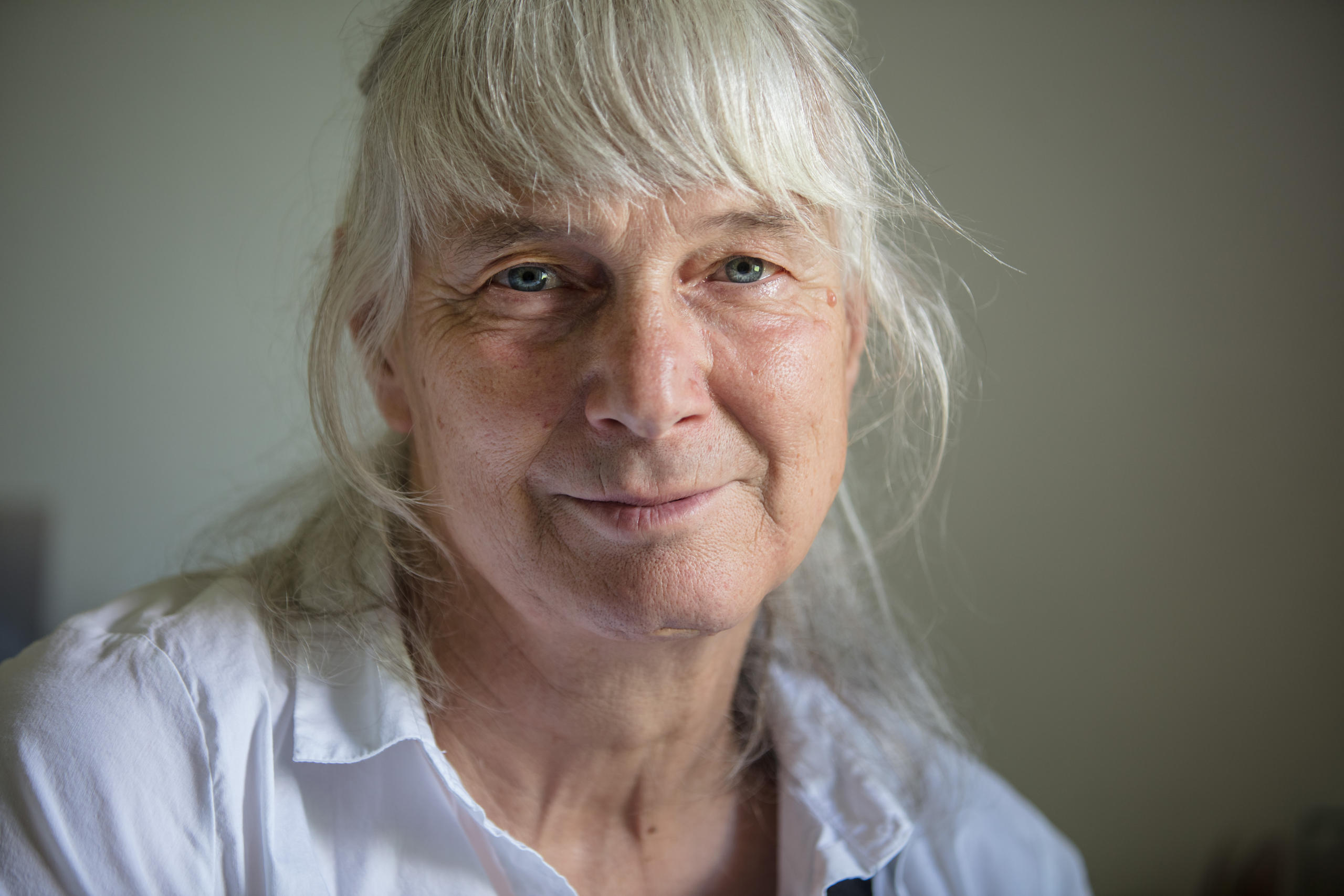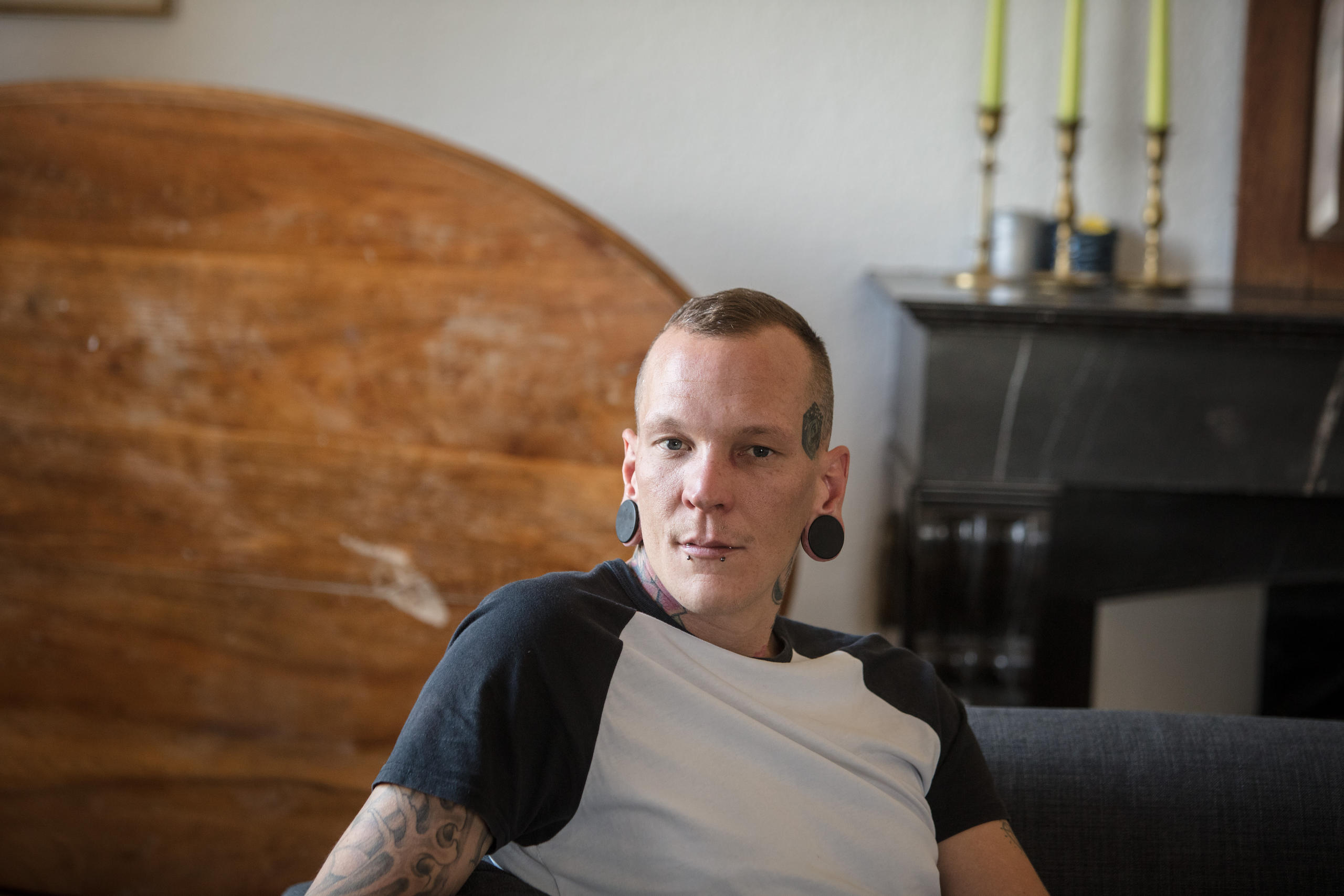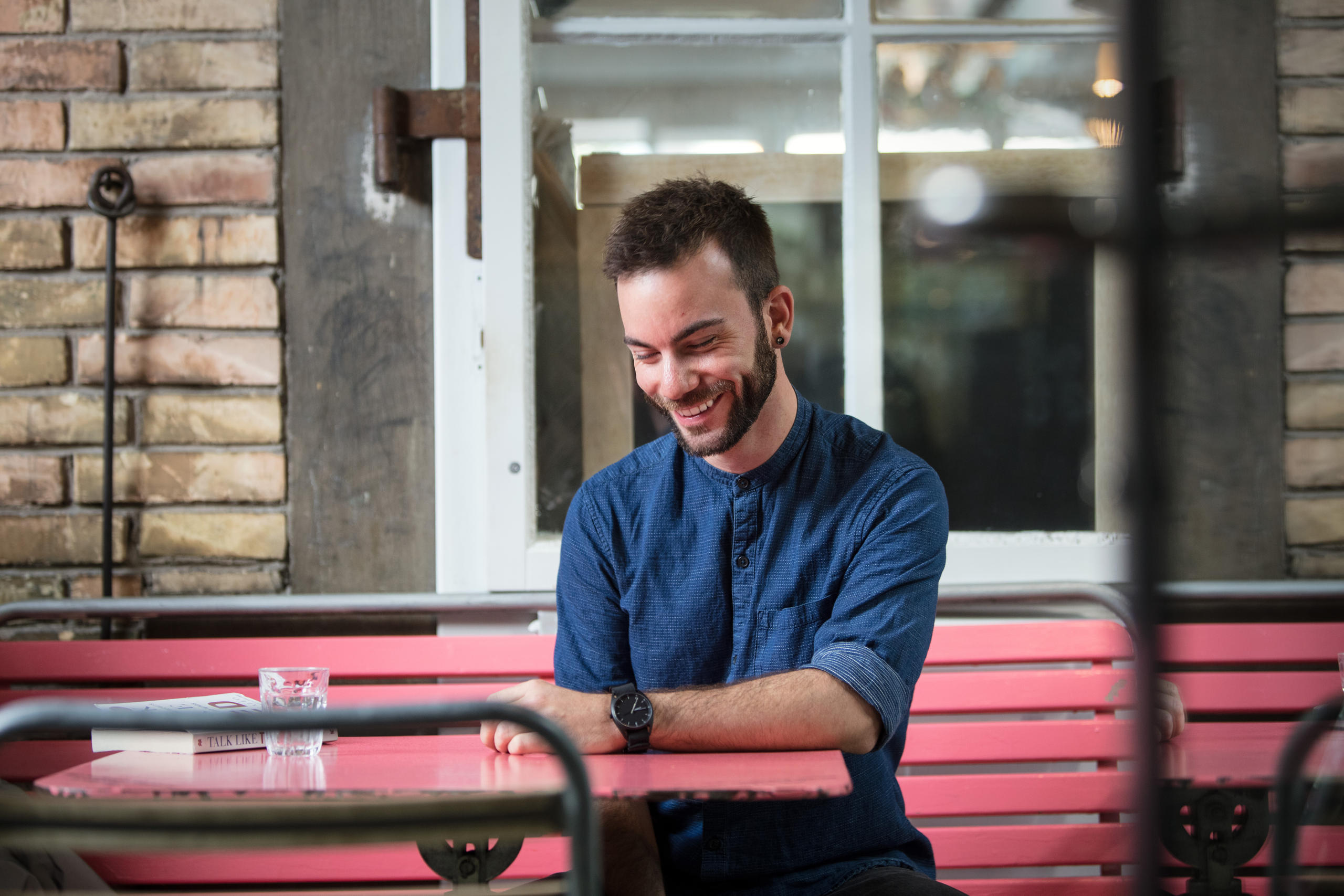‘People need to understand that normality doesn’t exist’

To feel like a woman and be accepted as one – this is the battle Stella Glitter has fought all her life. Transgender and “queer”, the 68-year-old artist pursues the dream of a free society, where even those who don’t fit into the usual slots are free to be themselves.
On the wall of the living-room, a picture documents the metamorphosis, the caterpillar that changed into a butterfly. Stella Glitter smiles: “I’ve come a long way, haven’t I?”
The little boy in a jacket and tie with an awkward look has given way to a woman who opposes conformity – a woman who has struggled all her life to be accepted as one. “This self-portrait is a declaration: I am here, I am a woman, transgender.”
The acronym LGBTIQ is used to designate people who are lesbian, gay, bisexual, transgender, intersex and queer. With time, other terms have also appeared to define diverse sexual orientations and gender identities.
Behind these letters are life stories that are sometimes simple, sometimes torturous, but all unique. For this reason, swissinfo.ch has decided to publish a portrait to illustrate each term which makes up the acronym. The series will be part of an important and current debate in society and will appear in the coming weeks on swissinfo.ch.
From the window of her kitchen in La Motte, a village in canton Jura just across the border from France, Stella gazes out over the horizon. “My presence causes confusion. The womanly look, the manly voice… ‘What sort of a creature is that?’, people wonder. Then comes rejection, hostility. People need to understand that normality does not exist.” Her hand reaches for a cigarette, while her thoughts turn back to her childhood.
Stella was scarcely five when she discovered her sexuality, when she realised she was “different”. Her body seemed strange to her, but she had no words to express what she felt. With puberty the doubts grew, the feeling of being “all wrong”, of “being guilty of some sin”. “I felt so insecure and suppressed, but I wasn’t able to rebel.”
The child of a Protestant clergyman, and the oldest in a family of seven children, Stella was expected to give good example. She tried with all her strength to take on the garb of a male.
In the little village of Schöftland in canton Aargau, besides being on a soccer team, she worked out in the fields and learned to train draught-horses, something she still loves to do. “I filled my days up to an incredible extent, so as not to have to deal with the confusion I had inside.”
Her mother knew, but did not let on, incapable of dealing with something she did not understand.
Rebel on the streets
At 20, after leaving school, Stella moved to Zurich to study veterinary medicine. It was the early seventies, and there was a sort of revolutionary ferment in the city. In social centres, the young talked about a freer society, and took to the streets to combat state repression.
Attracted by this ethos of rebellion, Stella got involved in radical movements. She quit university to spend all her time and energies on the political struggle. She worked in a factory to mobilise the working class, and she took out a license as a taxi driver to make some extra money.
In Zurich nightlife, in the few bars frequented by transgender people, she began to seek for a reference point of her own.

More
Stella Glitter: rock ‘n’ roll artist
“At that time there was no LGBT scene. I had to find out from books that I was not alone.” David Bowie was a model Stella could identify with, and in a love relationship with a woman she found a kind of freedom. “For the first time, with her, I could escape from the male role and be myself.”
In the radical left-wing scene, however, the theme of transsexuality was still taboo, as indeed was homosexuality. While friends were willing to call her Stella, she remained for them a (male) “comrade”, and there was no room for her even in feminist groups.
“I think they regarded me as a threat. They didn’t know where to place me. And then, at that time, all that mattered was the revolution. Basically people were a lot more conformist than they let on.”
Stella kept a low profile and sought a means of expression in the arts. “I learned to play the guitar, and I had a punk group and then a rock-and-roll group. I did theatre, I danced, I wrote… but I went on living out my transsexuality in secret, with my partner.”
Transition and rebirth
The big transformation happened when she was 31. It was 1980 and Stella had been sentenced to four and a half years in jail for a bank robbery. Sent to a men’s prison, she had to hide her true identity.
“I was never a person who was very attached to life, but at that point I realised that I could not go on looking at myself in the mirror thinking I had lived the wrong life,” she recalls.
Free at last, she started on a long transition process. A psychological examination of three days in Brussels, a first attempt at a hormonal treatment that failed, and then a second one.
Month after month, her body became softer, body hair disappeared, her breasts grew.
Some traces are harder to eradicate, however, like the low male voice with which Stella does Elvis impersonations. Her initial joy was followed by a feeling of disillusion. “I had spent years dreaming of the woman I wanted to be, and now I was disappointed with the result. But I was always against the idea of undergoing plastic surgery and having my vocal cords operated on: that was a limit which I did not want to go beyond.”

More
Recognising diverse sexual identities and experiences
Stella learned to love her new body, but felt she needed to take one more step in order to be fully “reborn”. This was to cut the link to old friends incapable of recognizing her as a woman, and to undergo a sex-change operation.
Even though this choice drove her apart from her first great love. “I always had a problem having a penis, I felt it as a foreign body. That was why I decided to have the operation, and I was fortunate enough to find a specialist who was willing to help.”
Stella was now able to spread her wings and fly. “Finally I could look at myself in the mirror without feeling disgust, love a woman, and feel myself loved as a woman. Unlike other transgender people, I was able to carry on my career without problems, and so I am here today, able to tell my story.”
High heels and a dress in the closet
In a society that mistrusts those who don’t fit into the pattern, Stella has had to make some compromises and not live out her femaleness completely.
“After my operation I put on high heels and a dress, but people thought I must be a transvestite.” So she put them back in the closet. Together with the clothes she was putting away a dream, affected by a certain sense of shame inherited from her Protestant upbringing.
“I would have liked to break with all the norms and conventions, but you never feel quite free from the judgement of others.”
In Stella’s view, nonetheless, there have been some steps forward in society. The topic of transgender is no longer taboo, the media are talking about it, and at the legislative level, Switzerland is slowly abandoning practices now denounced as inhuman, such as requiring sterilisation of anyone who wants to change their sex on the official register.
In daily life, however, Stella is always still dealing with fear and mistrust of what is different. “Up till two years ago, when I went into the women’s bathroom I would get insulted. Today I can deal with a few grins and sarcastic comments.”
Stella defines herself as avant-garde because in her ideal world there are no categories, but just different ways of living out one’s own identity and sexuality.
It would be a world where having a man’s voice and a female appearance is not perceived as a threat to the equilibrium of society. “In this regard, I am 100% ‘queer’, that is, part of the movement that rejects either-or gender classifications.”
Freedom at any cost
With a tinge of sadness in her expression, Stella lights up a last cigarette. Her face shows the signs of ageing, but she has lost none of her rebellious instincts.
Her eyes still search for freedom on the horizon. Just a year ago she gave up the hustle and bustle of Zurich for the peace and quiet of the countryside in canton Jura, where she has established herself in an “artist’s residence”.
Now past retirement age, she spends her days with painting, music, writing and hiking in the woods. “I always wanted a life that would allow me the maximum freedom, and I found it in art.”
Once in a while she returns to the city to play some rock-and-roll or exhibit her paintings. “I have made a long list of things I want to paint, and here I certainly have the time.”
Stella does not fear growing old. The time passing reassures her, like the picture hanging on the wall that bears mute witness to her metamorphosis. “I have found a kind of harmony. I know what I can expect from people, and at 68 I am no longer willing to let myself be hurt. Take me as I am, or leave me alone.”
In Switzerland, “trans*” people can change their name without actually changing their sex on the official register of persons, by applying to their cantonal government. They have the right to choose the name they wish.
To change sex and be officially registered as such, they have to apply to a court. Up till a few years ago, Swiss courts required all trans* people to undergo a sex-change operation and/or furnish proof of definitive sterility. This was based on a decision of the Federal Court dating back to 1993. The situation is now evolving. In 2011 the Appeal Court of canton Zurich authorised a sex change on the registry without an operation, and the following year the Federal Registry took a similar position.
While various court systems have adjusted their rules in recent years, others continue to require evidence of an operation, definitive sterility and/or a declaration by a psychiatrist that the person is transexual. This approach is condemned by TGNS, an association that advocates for trans*External link people, and it has been dropped by countries like Italy, France and Germany.
Translated from Italian by Terence MacNamee

In compliance with the JTI standards
More: SWI swissinfo.ch certified by the Journalism Trust Initiative





You can find an overview of ongoing debates with our journalists here. Please join us!
If you want to start a conversation about a topic raised in this article or want to report factual errors, email us at english@swissinfo.ch.